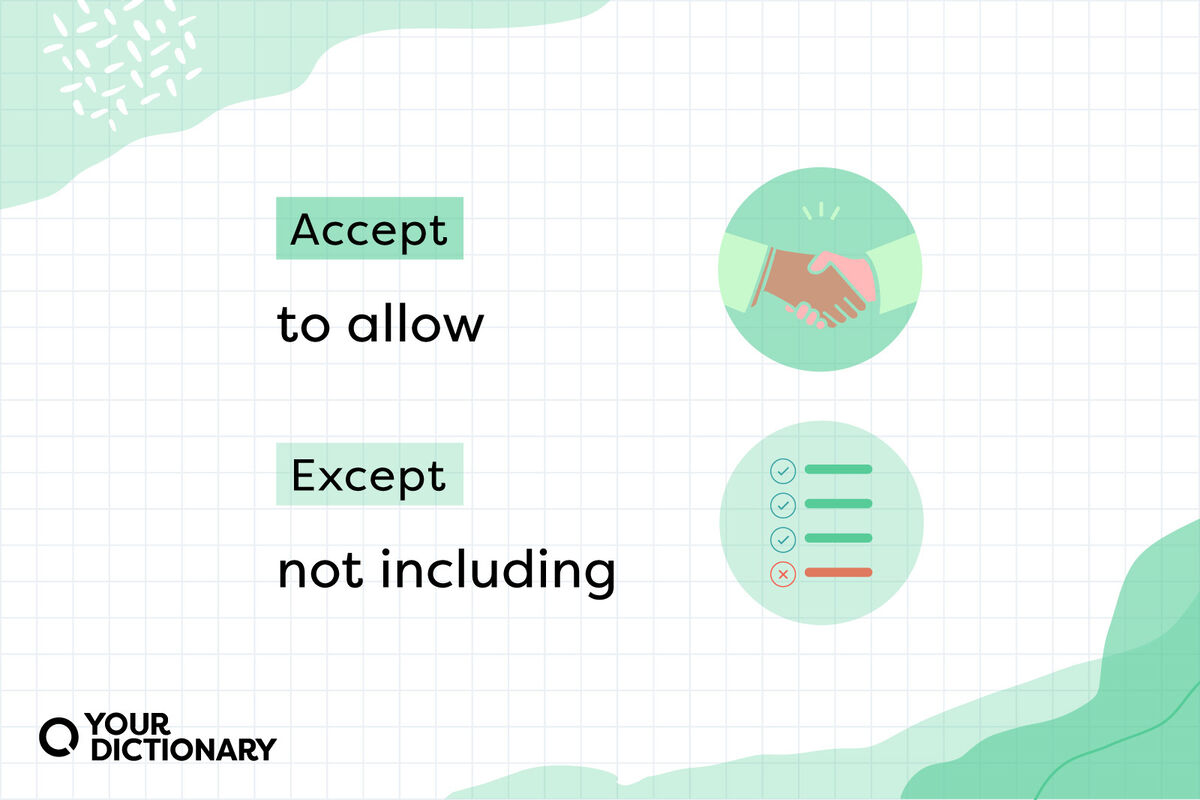
Does the store accept credit card payments, or do they except credit card payments? Depending on the word you choose, the sentence can have two totally different meanings. Learn what you need to know to correctly use accept vs. except in your vocabulary.
How to Use Accept and Except
Accept and except are commonly confused words that are spelled differently and pronounced differently. Most importantly, they have nearly opposite meanings.
| Word | Meaning | Example |
| accept | to allow | We accept employees from all backgrounds. |
| except | not including | Everyone is welcome except for you. |
Accept only has a verb form, while except functions as multiple parts of speech (including verb, preposition and conjunction).
Accept Meanings and Pronunciation
Accept (ăk-sĕpt') is a verb with several different meanings, all of which involve taking or recognizing something or someone. Accept can mean:
- to receive something that has been offered (to accept a gift)
- to be admitted to a group or organization (vote to accept new members of a club)
- to recognize something as being correct or true (accept the truth of a statement)
- to take payment (to accept cash or credit cards)
- to take formal receipt of something (to accept bids on request for proposal)
Using Accept as a Verb
When using accept in a sentence, remember that it always functions as a verb.
- I am so pleased to accept this award.
- Sharon needs to listen to us and accept the truth.
- The committee will meet tomorrow to decide which new member applications to accept.
- The candidates accept the results of this election.
- What forms of payment does your company accept?
- Please accept my deepest condolences on your loss.
Except Meanings and Pronunciation
The word except (ĭk-sĕpt') is most commonly used as a preposition. It can also function as a conjunction or as a verb. The word except has a few different definitions, all of which involve excluding something or someone.
Using Except as a Preposition
When you use except as a preposition, it connects a noun to the rest of the sentence. Except indicates that the noun that follows is not included in the action of the sentence. For example:
- Everyone except Stewart will be at the awards banquet tonight.
- I slept late every day this week except Saturday.
- Everything on the menu sounds terrific except the egg salad.
Using Except as a Conjunction
Except as a conjunction means "but." It's usually followed by a clause that starts with that, for or when. For example:
- I'd come to your party, except that I've got other plans.
- Kylie doesn't know anything about New York except that it's large and noisy.
- We enjoy visiting Washington except when it's raining.
Using Except as a Verb
A less common function of except is as a verb, when it means "to exclude." This usage can get confusing with accept, which is also a verb but has the opposite meaning. For example:
- We must except anyone who has not completed ten hours of practice from the roster.
- She's the best pitcher I've ever seen — present company excepted.
- Kids under two are excepted from the admission price.
Accept the Challenge — No Exceptions
Accept and except are two tricky words in the English language, but when you master their meanings, you'll use them correctly every time. Use a commonly confused words worksheet to identify which similar words you have already mastered and which ones you might need to review. Then, move on to exploring other similar words with an "e" or "a" at the beginning such as affect vs. effect.